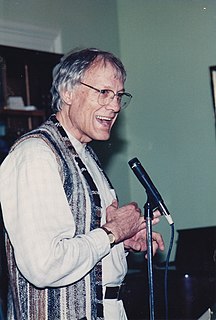A Quote by Frederick Lenz
I teach Zen, tantric mysticism, jnana yoga, bhakti yoga, Tibetan mysticism, occultism and psychic development. I also teach poetry and literature, film and many other different things.
Related Quotes
Yogas chitta vritti nirodhah - (Yoga is to check the mind from changing) - which is acceptable to all. That is also the goal of all. The method is chosen according to one's own fitness. The goal for all is the same. Yet different names are given to the goal only to suit the process preliminary to reaching the goal. Bhakti, Yoga, Jnana are all the same.
Mysticism has often been misunderstood as the attempt to escape this simple, phenomenal world to a more pure existence in heaven beyond. This is not mysticism, but Gnosticism. Biblical mysticism is the attempt to exit 'this world' to an alternative reality that pervades the old order. Its goal is to jettison the mind-set that says 'greed is good,' selfishness is normal,' and 'killing is necessary.' Mysticism in biblical terms is not escapism, as so many have caricatured it, but a fight for ethics and social change.
Ninety percent of what most yoga teachers do is teach asana practice. While asana discharges stress and so forth, it was never intended to be a standalone practice. The true intent of yoga is personal transformation. What we get out of the privilege of teaching prisoners is the opportunity to focus on our own personal development. You can be of service, and, while helping others transform their lives, you have the deeper opportunity to transform your own. What we teach in prison is how we live our lives.
Of course, mysticism is very hard to isolate because, given the kind of consciousness that I was sort of instructed in as religious consciousness; that borders on mysticism so closely that it's hard to know whether you qualify or not, or whether mysticism is artificially isolated when it is treated as a separate thing from experience. Obviously, mysticism can be a form of madness, but then consciousness can be a form of madness.





























